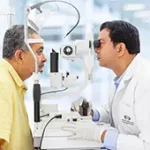The retina is a fragile layer of tissue at the back of the eye. It converts light into electrical signals, allowing the brain to process visual information. It’s a crucial component of the visual system, consisting of layers that detect and transmit light to the brain through the optic nerve. Damage to the retina or any kind of retinal disease can cause severe vision problems. Let’s look at some of the most common kinds of retinal issues that people face.
There are 3 main types of retinal detachment, each requiring different treatment approaches:
Each of these needs timely and tailor-made retinal detachment treatments to prevent permanent vision loss.
Retinal diseases are diagnosed through a combination of detailed eye examinations and imaging tests. Doctors assess the retina’s structure and function to detect any abnormalities. Common tests include dilated eye exams, where the pupil is widened to give the doctor a clearer view of the retina, and optical coherence tomography (OCT) for detailed imaging.
There are 3 kinds of retina tests that can be performed to monitor the progression of retinal diseases and determine the appropriate treatment. Getting these tests done regularly is highly recommended to prevent any permanent loss of vision or severe impairments.
Treating retinal diseases depends on the specific condition and its severity. There are a few options that might be considered:
Recovery time after retina treatments can vary depending on the procedure:
In all cases, it is imperative to follow your ophthalmologist’s postoperative instructions.
The eye uvea is the middle layer of the eye, consisting of the iris, ciliary body, and choroid. This layer supplies blood to the retina and helps control the amount of light entering the eye. Damage to the uvea can lead to conditions like uveitis eye, which can cause vision issues.
It is the inflammation of the uvea and can affect one or both eyes. It leads to redness, pain, light sensitivity, and blurred vision. If no uveitis treatment is done, this can cause permanent damage to the retina or other parts of the eye.
Uveitis can occur in one or both eyes and can affect people of all ages. While the exact cause of uveitis is unknown, it can be associated with autoimmune disorders, infections, and trauma.
Understanding and identifying the causes of uveitis is crucial for determining the appropriate uveitis treatment.
Diagnosing uveitis involves a comprehensive eye examination and tests to determine the underlying cause. Your doctor will likely perform a slit-lamp examination to assess inflammation and may order blood tests or imaging to identify infections or systemic conditions causing the inflammation.
Uveitis is a condition that can threaten vision, and its treatment depends on the type of inflammation and several other factors. Standard uveitis treatment options include:
Early diagnosis and the correct uveitis treatment are essential to prevent complications such as glaucoma or retinal detachment.
Centre for Sight, India, offers specialised care for retinal diseases and uveitis treatments. Here’s why patients trust us for their care:
Many retinal diseases can be treated or managed with treatments like laser therapy, medications, or surgery, depending on the condition. Early detection improves the chances of successful treatment.
Retinal impairment refers to any damage or dysfunction in the retina that can affect vision. This includes conditions like retinal tears, detachment, or macular degeneration and diabetic retinopathy.
Uveitis treatment often involves corticosteroids (eye drops, injections, or oral medications) to reduce inflammation. In severe cases, immunosuppressants or surgery may be required.
The most common cause of uveitis is autoimmune diseases, such as rheumatoid arthritis or lupus, where the body’s immune system attacks healthy tissue, including the eye.
Find a doctor tool assists you in
choosing from our diverse pool of health specialists. Discover better health & wellness by using our doctor ratings & reviews to make your choice
Find an eye specialist
From locating one of our centres across India to booking an appointment, we are just a click away!
Locate a Centre
The SMILE laser eye surgery is a short form for Small Incision Lenticular Extraction. It is a highly advanced technology.
See Our All Specialities
Centre For Sight . 2024
